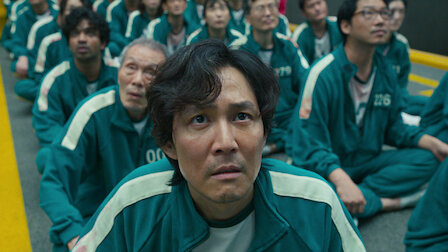“Squid Game” points out how obsessed Americans are with desensitized violence

Squid Game has taken the world by storm. The series dives into topics like authority, economic suffrage, and brutality. Credit: Netflix
November 16, 2021
Warning: spoilers for Squid Game are included in this article.
Over the past month, the internet has been obsessed with Netflix’s latest hit, Squid Game. The show is so big that you are bound to see content wherever you are, ranging from “what I would feed each character” to “dalgona making gone wrong.” Squid Game’s impact is so big that according to Variety, it is predicted to make Netflix nearly 900 million dollars. As of October 16th, 87 million Netflix accounts had watched the entirety of the series.
Squid Game’s success is very impressive, and the critical acclaim is well deserved. The series tells the story of how many debt-ridden citizens are lured into the Squid Game, with the hopes of winning a massive cash prize. The contestants participate in 6 childhood games, and the person to win all 6 games wins the money. However, there is a twist: if you lose a game, you lose your life. In a deeper sense, the show dives into complex issues like authority, economic suffrage, and brutality. The biggest lesson I learned from the show, however, was from the reaction of all those who watched it. In a show about human life being disregarded, we were almost addicted.
Fantastic but disturbing, the show had viewers hooked. “I really like shows that only have a few episodes but are each 50 minutes to an hour long… I was hooked by the quick-moving plot and intriguing characters,” said senior Raven Holm.
At times, the show felt brutal. When people died, they died with blood, pain, and feelings. Each death felt personal, and maybe that is why this show felt different from others. The show emphasized how painful death is, and somehow did this while senselessly killing people off. Squid Game did this better than other franchises where many people are senselessly killed, such as Star Wars and Marvel. Perhaps this was because the “good guys” were being killed off in Squid Game. When heroes kill villains, nobody cares.
Still, I heard a couple of people talk about how they felt that Squid Game was filled with too much “desensitized violence.” I feel the need to define what desensitized violence is. Desensitized violence tones down the brutality to downplay the seriousness of what has occurred. More importantly, desensitized violence tends to benefit the hero. If the hero kills someone, it is always validated, and the murdered character is intentionally forgotten.
The issue of desensitized violence is especially prevalent in American cinema. As Americans, we are so used to it that we forget that those who are killed were supposed to be living things. We even enjoy the violence, we root for some characters and hope that others will die. We cheer on the Avengers as they hack through swarms of living beings. We root for Han Solo as he shoots through countless Stormtroopers. We support these characters, and validate their violence because they are supposed to be the “hero.” We find entertainment in this because “evil” characters are killed off in tame, “PG” ways. Without blood or any sign of suffering.
Interestingly enough, Squid Game even touches on America’s obsession with violent TV. The only english-speaking characters in the series are called the VIPs. The VIPs watch the violent games for pleasure, and they even bet on their favorite contestants to pass each round. Furthermore, show creator Hwang Dong-hyuk says that the inspiration for the VIPs was Donald Trump. “I think he kind of resembles one of the VIPs in the Squid Game. It’s almost like he’s running a game show, not a country, like giving people horror,” Hwang told IndieWire. While it may seem exaggerated, the point is clear. Americans will gleefully watch violent content, without even questioning its morality.
I will admit to falling into these tropes as well. I’ve rooted for and against certain characters in every action movie I’ve seen. I have blankly watched “evil” characters be slaughtered. I’ve made excuses for the heroes, even though so many of them were just as murderous as the villains. It wasn’t until watching Squid Game that I realized how used to cinematic violence I was.
Squid Game was different. Like I said earlier, the deaths felt more realistic and personal. While the show was extremely disturbing, it painted a picture of what violence actually looks like. In Squid Game, cinematic violence had finally been sensitized.
Overall, I don’t think that I advocate for cinematic violence, especially that involves killing. However, if there is violence on the screen, I hope that the hero’s actions aren’t automatically justified for being a hero. I hope that when a character dies, they don’t become an afterthought. Death is much more serious than that.
For those who felt Squid Game was “too violent,” I respect your opinion. But so are all Marvel movies. So is Star Wars. The only difference is that Squid Game is realistic, and other cinema is not. We have all become used to desensitized violence, as Squid Game has shown us.












